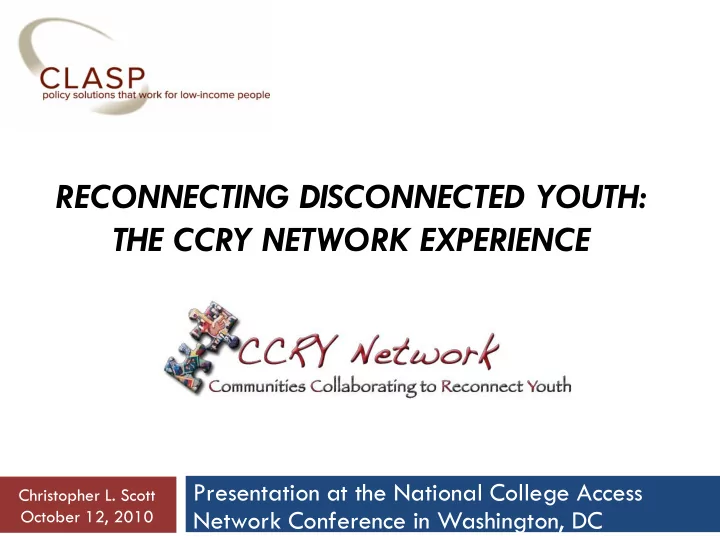

RECONNECTING DISCONNECTED YOUTH: THE CCRY NETWORK EXPERIENCE Presentation at the National College Access Christopher L. Scott October 12, 2010 Network Conference in Washington, DC
What is the CCRY Network Formally established in 2006, the CCRY Network is: Outgrowth of Youth Opportunity Movement Focused on cross-system approaches for reconnecting youth Gathers semi-annually for peer-to-peer exchange on effective practice and to focus attention on areas of collective interest Local advocacy voice for Federal Policy Affinity group of 16 communities Across the Nation
CCRY History and Overview 36 communities received Youth Opportunity Funding to Build Comprehensive Delivery systems KEY COMPONENTS Youth Opportunity Centers Partnerships with secondary and post secondary Cadre of case managers Collaboration with justice, Multiple education pathways child welfare, workforce Work experience, internships Community based resources and workplace connections Quality management & Personal development/ tracking system leadership /civic engagement/ recreation
YO! Participation in Education
YO! Participation in Other Activities
Findings from YO! Impact Study Nearly 73,000 young people were engaged in education re-engagement activities Pell grant receipt in the urban sites increased A CLASP survey of dropouts in YO! found 40 percent indicated college goals Of those without college ambitions 45% had specific career goals Of those with prior criminal activity 41% had post secondary intentions
CCRY Member Communities Baltimore Boston Brockton Denver Hartford Hawaii Houston Indianapolis Kansas City Los Angeles Memphis Oakland Philadelphia Rural Arkansas San Diego Seattle
What does CCRY mean by Disconnected Youth? The term „disconnected youth‟ means an individual between the ages of 16 and 24, who fall into one of several high-risk categories.
Community Capacity Building Learning from the Youth Opportunity Experience CCRY communities Making the Juvenile Justice/ have invested in Workforce Connection considerable Building an Effective Youth Delivery capacity-building System efforts and innovative Building an Employer Engagement approaches Pipeline Benchmarking Progress on the Path to labor Market Success
CC CCRY RY Ca Capit itol l Hill Hi ll Brie Briefi fing ng On March 4, 2010 , the CCRY Network • held a briefing, “Recommitting to Our Nations Youth: Building on the Legacy of Youth Opportunity,” to showcase the impact YO! funding had on disconnected youth and the lessons learned. CCRY network raised awareness of the • existing gaps in youth services and the need for Federal investments to support communities in reconnecting youth.
The goal: Connections to Multiple Pathways CBO Providers Adult Education Local School District Post secondary Institutions Entry Point Entry Point Key Education Partners Competency- based Dual enrollment Good jobs Integrated basic skills instruction Middle college instruction Credit recovery Bridge programs Modular curricula GED plus Good wages MULTIPLE CAREER 2 & 4 YEAR PATHWAYS COLLEGE Good Advocacy Guidance Support & Referrals Transition Support Retention Support careers Transitional jobs Internships Customized training Community -service OJT Industry pipelines projects Subsidized & un- Work/Study Service Corps subsidized jobs Full and part-time jobs Community Employers Workforce Boards Industry Leaders Development
CCRY Network recommends That together, with policymakers, we must: Make dropout recovery a part of education reform Connect WIA, HEA, Career Tech, ESEA resources to create college and career training pathways for disconnected youth; Secure large scale investment and effective cross- system collaboration to build community capacity to better serve disconnected youth; Greatly expand work experience opportunities, and Share collective accountability for better youth outcomes
In Their Own Words Video based on survey of nearly 200 youth in 13 communities
Links to Resources Learning From the Youth Opportunity Experience: Building Delivery Capacity in Communities of High Youth Distress http://www.clasp.org/admin/site/publications/files/0283.pdf Making the Juvenile Justice-Workforce Connection for Re-entering Young Offenders www.clasp.org/admin/site/publications/files/0329.pdf Building a Comprehensive Youth Employment Delivery System: Examples of Effective Practice http://www.clasp.org/admin/site/publications/files/Youth-Employment- Systems.pdf Creating Postsecondary Pathways to Good Jobs for Young High School Dropouts http://www.clasp.org/admin/site/publications/files/0438.pdf Collective Work/Collective Responsibility Fact Sheet on the Evaluation of Youth Opportunity Grant http://www.clasp.org/admin/site/publications/files/FACT-SHEET-FROM- the-YOUTH-OPPORTUNITY-GRANT-EVALUATION.web.pdf
Contact Information Christopher L. Scott Youth Policy Analyst, CLASP cscott@clasp.org Center for Law and Social Policy ∙ 1200 18th St. NW, Suite 200 ∙ Washington, DC 20036 ∙ 202 -906-8027
Recommend
More recommend